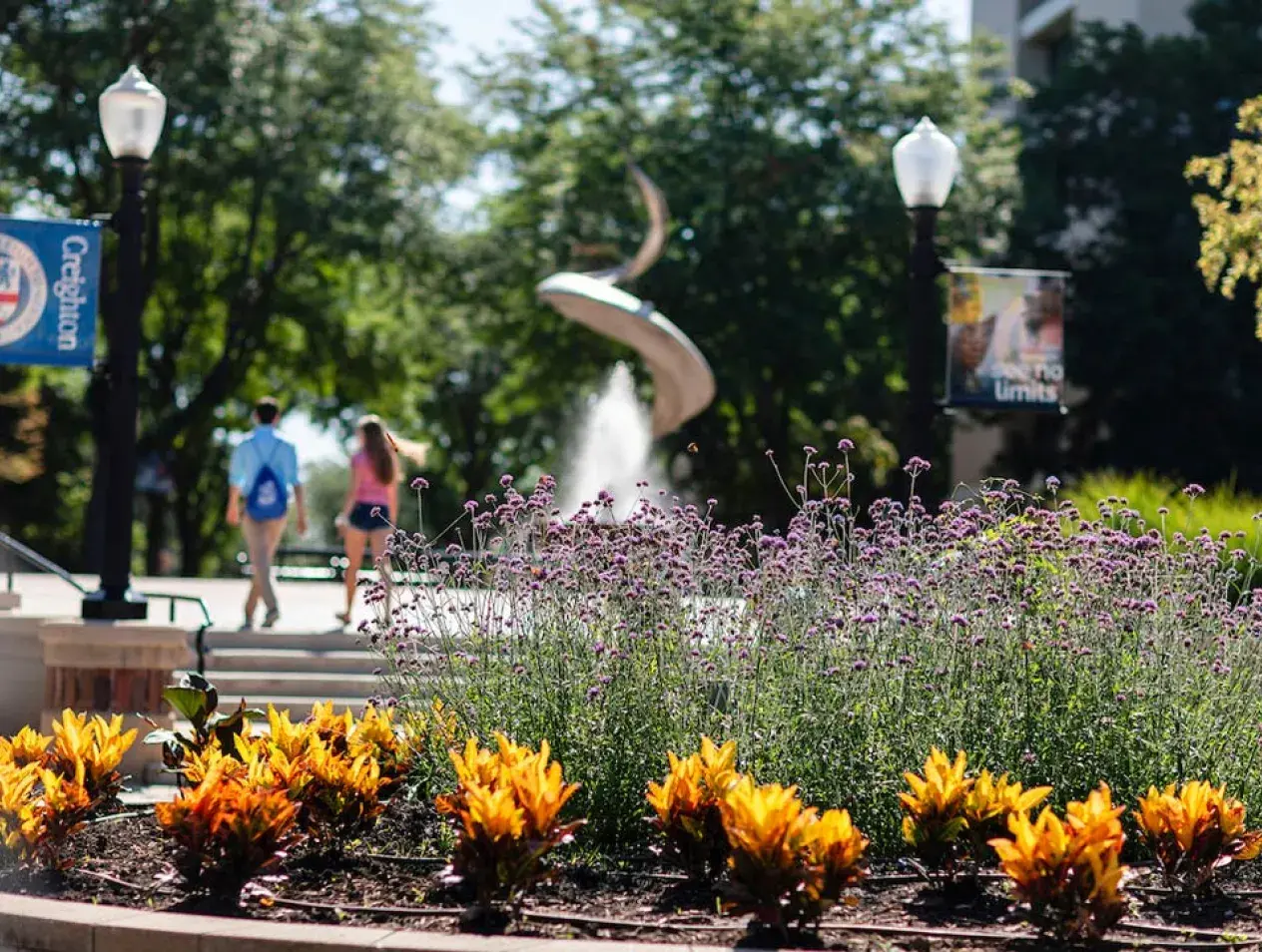
About our Mission
A Jesuit Education that Leads to a Life Well-lived.

Our Mission
Guided by our Jesuit, Catholic tradition, the Creighton College of Arts & Sciences forms students who appreciate humanistic traditions, discover truth, goodness, and beauty, question systems and structures, and transform society through willing the good of all.
We live our mission in the following ways:
- Seeing God in all things through the pursuit of truth in all its forms.
- Embracing Gospel values through a commitment to a faith that does justice.
- Sharing our God-given gifts for and with others.
- Developing the whole person - body, soul, and mind.
We're here to serve our community.

Founded in 1878 by the Jesuits, members of the Society of Jesus, Creighton University is one of just 28 colleges and universities in the United States that share a Jesuit heritage. The inspiration for this kind of interdisciplinary Jesuit education comes from Ignatius Loyola, the founder of the Jesuits, who began schools in Europe more than 450 years ago.
Creighton’s College of Arts and Sciences connects Jesuit values and a commitment to academic excellence, so that our graduates thrive professionally and play an integral role in creating a more just world. By sharing our Jesuit values, we’ll help you realize a life well-lived—one defined by a love of learning and service to others.
The hallmarks of an interdisciplinary Jesuit education are the Ignatian charisms, or values. We consider these God-given gifts that our graduates bring to the world.
They are:
Finding God in All Things: This is the essence of Ignatian spirituality. Ignatius of Loyola taught others to experience life attuned to God’s activity in everyday circumstances. Finding God in all things is an invitation to encounter God’s presence in each moment, to become aware of God’s beauty in everything, and to notice God’s action in all the events of our lives through an ongoing process of personal discernment. As such, every academic discipline provides hope to encounter the divine.
Cura Personalis: Latin meaning “care for the person”, or “personal care”. Cura personalis is having concern and care for the personal development of the “whole person”, and dedication to promoting human dignity. This includes being open to and accepting of a person’s religious and spiritual development. It also describes the type of care we give as educators: we give not only of our knowledge, expertise and skill, but of ourselves as well. The care given, and the care received, is “personal care” not “institutionalized care”.
Magis: Latin meaning “more”, or “the greater good”. Magis embodies the idea of discerning, “What is the best choice in a given situation, of several good choices, to better glorify or serve the Lord?”; e.g. choosing between options encountered in life with a primary focus of being “God centered”. Magis goes beyond striving for excellence. It is a value central to Ignatian spirituality and encompassed by the Latin phrase “Ad Majorem Dei Gloriam” meaning “For the Greater Glory of God”. (Motto of the Society of Jesus).
Men and Women For and With Others: A spirit of giving, service, and solidarity with those in need, recognizing that all humans have physical, emotional, and spiritual needs. Our goal, as described by Father Peter-Hans Kolvenbach, S.J., a former Superior General of the Society of Jesus, is to form leaders who are “men and women of competence, conscience and compassionate commitment.”
Faith That Does Justice: Faculty, staff and students alike are encouraged to seek justice for all God’s creatures, especially the poor and marginalized. According to the Gospel, our goal is to work for the betterment of society as a whole. We strive to prepare graduates who will be change agents in society, “contemplatives in action.”
The College of Arts and Sciences (CCAS) Mission Catalyst committee serves to facilitate reflection on, and implementation of Creighton’s Jesuit Catholic Mission.
The committee is comprised of faculty representatives from each academic department within the College, with each member being appointed by the CCAS Dean in consultation with the committee member’s department chair.
Each committee member’s central responsibility is to serve as a liaison for his or her respective department and advocate for Mission-reflection during program development and implementation. This responsibility includes, but is not limited to:
- Attending regularly scheduled committee meetings, which typically occur monthly during the academic year
- Serving as a voice at the department level to promote Mission reflection
- Serving as a voice at the department level to ensure hiring for Mission
The committee’s central responsibility is to facilitate reflection on, and implementation of, Creighton’s Jesuit Catholic mission at the department level, and when appropriate, the CCAS and University levels. This responsibility includes, but is not limited to:
- Advocating for Mission reflection during curriculum development, implementation, and revision, as well as the development, implementation, and revision of other academic and co-curricular programs, when necessary
- Providing recommendations to the CCAS and University Curriculum Committee to ensure that courses proposed for inclusion in the Magis Core adequately articulate “Fit to Mission”
- Providing recommendations during searches for senior-level administrators to ensure hiring for Mission
- Discussing mechanisms for assessing Mission-related activity among faculty
2020-2021 CCAS Mission Catalysts
Convener: Rebecca Murray, PhD (Dean’s Office)
Departmental Representatives:
Biology: Mary Ann Vinton, PhD
Chemistry: Bruce Mattson, PhD
Communication Studies: Laura Gill, EdD
Cultural and Social Studies: Monica White, MS
Education: Ron Fussell, EdD
English: Faith Kurtyka, PhD
Exercise Science: Geri Moore, MA
Fine and Performing Arts: Patrick Roddy
History: Britta McEwen, PhD
Journalism, Media and Computing: Brian Kokensparger, PhD
Mathematics:
Modern Languages and Literature: Jose Miguel Lemus, PhD
Philosophy: Jeanne Schuler, PhD
Physics: Janet Seger, PhD
Political Science: Scott Hendrickson, PhD
Psychological Science: Alicia Earl, PhD
Theology: Jay Carney, PhD


